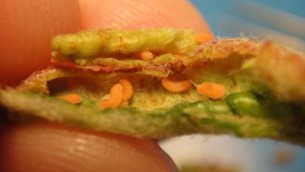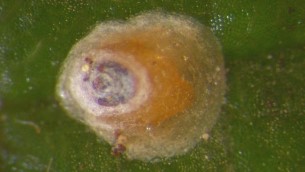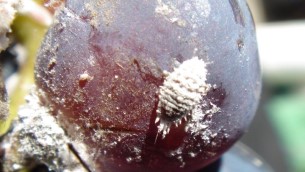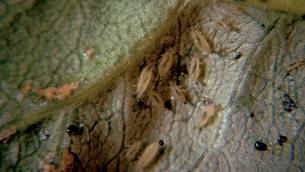- Revolutionary two-way systemicity allowing Movento 100SC to protect developing leaves and difficult to reach parts of the plant.
- Formulated with an optimised and highly effective adjuvant package designed to maximise product uptake into leaves and provide outstanding biological efficacy.
- Shown to have superior plant uptake to similar products providing peace of mind.
- Proven control of important crop pests for over a decade.

- Home
- Products
- Insecticides
- Movento 100 SC

Movento 100 SC
Movento 100SC is a proven and highly effective solution for controlling a range of sucking pests in fruit crops, including:
• Armoured scales in Kiwifruit.
• Mealybug in Grapes.
• Apple leafcurling midge, woolly apple aphid and armoured scales in Apples.
• Kelly's citrus thrips, Australian citrus whitefly and armoured scales in Citrus.
• Pear leafcurling midge in Pears.
• Thrips and mealybug in Blueberries.
Movento 100SC is unique in that it has two-way systemicity in plants. This means it moves both upwards and downwards and can therefore reach pests that cannot be directly targeted by spray coverage. Movento 100SC has fully researched and tested in-built adjuvants that optimise the uptake into plant leaves. Additional adjuvants are not required. Movento 100SC is compatible with IPM systems, being harmless or only slightly harmful to common beneficials.
Please download product label for full usage guidelines.
-
Benefits
-
Crop Suitability & Usage
-
Resources
| Crop | Pests Controlled |
|---|---|
| Apples & Pears | Apple leaf curling midge, Pear leaf curling midge, Armoured scale and Woolly apple aphid |
| Grapes | Mealybugs |
| Kiwifruit | Armoured scales |
| Citrus | Kellys citrus thrips, Armoured scales and Australian citrus whitefly |
| Blueberries | Thrips and Mealy bug |
| Product Type | Insecticide |
| Active Ingredient | Spirotetramat 100g/litre |
| Formulation Type | Suspension concentrate |
| Application Rate/Timing | Apple leafcurling midge Apply 48 ml/100 L water (minimum 960 ml/ha) to coincide with periods of peak ALCM egg laying. Apply between mid-November and mid-December for control of the second generation and again between mid-January and early February for control of the third generation. Pear leafcurling midge Apply 48 ml/100 L water (minimum 960 ml/ha) to coincide with periods of peak pear leafcurling midge egg laying, either just prior to or immediately after flowering. Woolly apple aphid (WAA) Apply 112.5 mL/100L of water for early control of WAA which will allow populations of Aphelinus mali to increase and provide biological control. Apply a single application one to three weeks post petal fall before WAA colonies become established. NB: For practicality, where the priority target is Apple leaf curling midge, but a treatment for Woolly apple aphid is also required, Movento 100SC should be applied at 112.5 mL/100L to coincide with the peak of the second generation Apple leaf curling midge egg laying. Movento will not provide season long control of WAA, and should be used for early control as part of an Integrated Pest Management (IPM) program. Armoured scales Apply 48 ml/100 L water (minimum 960 ml/ha) to target scale crawler release periods. For the first generation San Jose scale control apply between mid-November and early December, and for the second generation as required from late January to the second week of February. For oystershell scale control (South Island only) apply between mid-December and mid-January. There is a risk of fruit russet occurring to russet-prone varieties when applied under cold or slow-drying conditions. Mealybugs Apply 150 ml/100 L of water (minimum 750 ml/ha) in 500 L of water/ha. Make a maximum of two applications when new season shoots are 20-50cm long, or just prior to flowering or immediately after flowering. Do not apply later than 10 days after flowering. Armoured scales Use 48 ml/100 L of water (minimum 960 ml/ha) at greentip and the again pre-flowering. Ensure the 960ml/ha rate is used. Refer to the 'Bayer Informs Kiwifruit' for more information. Kellys citrus thrips, Armoured scales and Australian citrus whitefly Kellys citrus thrips - apply 96 ml/100 L of water. Armoured scales and Australian citrus whitefly - apply 48 ml/100 L of water. Apply after flowering when pest thresholds are reached and repeat if needed before calyx closure and pre-harvest. Use a maximum of 3 applications per season. Thrips and Mealy bug Use 150 ml/100L of water (minimum of 750 ml/ha). Apply at 14 - 21 day intervals, up to three times per season, using sufficient water to obtain good coverage. |
| Compatibility | Movento 100SC is compatible with most fungicides. |
| Withholding Period | Apples: 14 days (35 days for nil detectable residue) Blueberries: 7 days. Citrus: 21 days Grapes: Do not apply after 10 days post-flowering. Kiwifruit: Apply only pre-flowering. Pears: 35 days |
| Grazing | Livestock that have been grazing or fed treated crops should be placed on clean feed for 2 months prior to slaughter. |
No results for this category. Please select a different one.

Movento 100SC Label

Movento 100SC SDS

Movento 100SC HazNote

Movento - Why formulation is important

Movento - Bayer Informs on Grapes

Movento - Bayer Informs on Kiwifruit

Movento 100SC User Guide for Apples

Movento 100SC User Guide for Citrus

Movento 100SC User Guide for Grapes

Movento 100SC Apple Compatibility

Movento 100SC Grape Compatibility
Latest Movento 100 SC news
Related Pests

Apple Leaf Curling Midge
Dasineura mali

Armoured Scales

Woolly Apple Aphid
Eriosoma lanigerum
Woolly apple aphid (Eriosoma lanigerum) is a prevalent pest within apple orchards and can cause significant damage to the trees. The aphids (often referred to as woolly aphids) infest the aerial parts of trees and sometimes the roots, sucking sap from the plant.
Feeding damage from heavy infestations can result in knotted and galled lumps on older wood and bud damage on shoots which can negatively affect the following years crop. Fruit contamination and infestation contributes to significant productivity losses and aphid infestation of fruit calyces can present a market access problem in some markets.

Mealy Bug

Kellys Citrus Thrip
Pezothrips kellyanus



